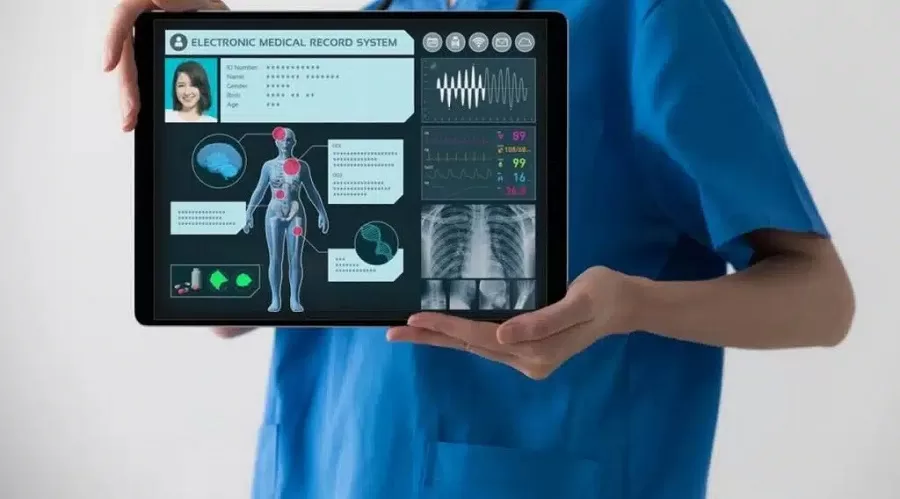Health
The Integration of Digital Health Technologies: Revolutionising Patient Care

- It is expected that technologies like EHR, telemedicine, and wearables will bring efficiency and accessibility to the health service, but they are never likely to remove the essential role of doctors in the process of care.
- The up-and-coming scenario of health care is one in which there is a smooth incorporation of digital tools with the human touch, such that when it all comes together, something that creates the right balance of technological prowess and warm, expertly delivered care will exist.
The incorporation of digital health technologies into the healthcare sector has shifted the current phase into a revolutionary one. EHRs, telemedicine, and artificial intelligence have changed patient care, making it more efficient, accessible, and accountable. Despite these developments, doctors continue to play a crucial role in ensuring high-quality care and positive patient outcomes.
The Advancement of Digital Health Products
Digital health encompasses numerous technologies through its employment in health services provision. The technology of Electronic Health Records (or EHRs) has significantly replaced the conventional paper chart, allowing healthcare providers immediate access to the data over which sharing practices were established, thus fostering coordination and reducing errors. Namely, telehealth makes it possible for patients to consult with a physician from a distance in cases where services are not imminently urgent (granting not-so-difficult access to healthcare for those in remote and underprivileged areas without the need to visit in person). Wearable devices, such as fitness trackers and smartwatches, are designed to monitor a user’s real-time health statistics, aid them in managing their health better, and warn them at early stages of any potential threats.
Improving Efficiency and Accessibility
One incredible impact of the pervasive use of digital tools on healthcare has been found in increasing this industry’s efficiency. In doing so, technology works very well for healthcare professionals to help them ease their burden administratively and meaningfully concentrate on patient care. Telemedicine, in particular, stands as historically one of those pivotal instruments for actually increasing healthcare services to less privileged communities that are found too far from most facilities or, due to age, disability, and other circumstances, are unable to travel to get the help they need. Additionally, by replacing physical encounters with digital interactions, these technologies make the healthcare realm adaptable and convenient.
The Indispensable Role of Physicians
They have the edge over telehealth and AI in terms of their powerful capability to augment their practices; used together, the two great modalities can innovate new healthcare horizons. I believe AI and telehealth could have great potential for processing data to assist physicians in their decision-making process; still, if left alone, processes will dillydally in a way that can go stale. This is well said! A robot-assisted operation embedded with innovative simulation technology is, without a shadow of a doubt, easy and convenient.
Walking the Tightrope in Adaptation and Reflux
The very future of health care lies in the fusion of highly advanced technological digital functionalities intertwined with the unmatchable human touch that is to be stood forth by the physicians. Healthcare industries will have to consider new ways in which digital tools can entirely uplift medical principles while ensuring the same compassionate care patients demand and deserve is continuously available. Physicians must adapt to technological changes, which should help leverage their expertise and care while keeping them grounded as the core of patient welfare.
Technological Innovations That Transform Patient Care
AI, telemedicine, and subscription-based services have all emerged as novel tools in the healthcare business to improve patient care. For example, Amazon One Medical is transforming healthcare delivery by employing AI-powered communication technologies to improve patient interactions, prescription services, and care coordination. There are still viable doubts regarding the availability and cost of these on-demand services. Is it genuine or a mere infatuation? While these services are convenient, they are not insurable under conventional health insurance and further might deepen the imbalance within health care for those excluded by additional care.
Subscription-Based Healthcare Models
Subscription-based models are fast gaining popularity to offer patients quicker access to healthcare support services. While providing more flexible and immediate care, they are raising genuine concerns about their affordability and accessibility. With a population of over 300 million people dependent on health insurance, the rising cost of on-demand services is likely to hit many financially hard. With doctors’ shortages set to increase, it will be important to manage these alternative services with wider digital health solutions to ensure greater accessibility and functioning with quality healthcare delivery.
Amwell’s Contribution to Healthcare Accessibility
With its rapidly increasing digital presence, Amwell is one transformative company in health delivery. The company’s platform has been a priority from the very beginning, especially as concerted efforts are being made to penetrate the Military Health System. The innovative, customer-specific solutions tailor-made by Amwell are now creeping into the healthcare system through industry players like Leidos. Henceforth, the nascent role emphasised will highlight digital health’s potential to cut across the silos of care among patients, improve outcomes for patients, and provide vital services for patients in need.
Health Plans Leaping on Digitised Care Solutions
In today’s evolving way healthcare providers are giving accountable care, health plans are showing a lot of enthusiasm in adopting technology-driven solutions to facilitate such care. Over this time frame, more propensity has been evidenced towards going digital with the increased usage of patient portals. Patient portals that afford access to one’s medical records, the opportunity to schedule appointments, and the ability to guide and facilitate doctor-patient communication have been gaining quite a lot of momentum, especially amongst the young adult population and those atop the income ladder. Moreover, by their enthusiasm towards being part of digital healthcare platforms, the Baby Boomer generation shows that members of all age groups are becoming more amenable to technology-based healthcare.























































